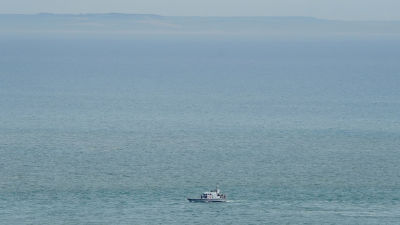French MEPs accuse UK of turning English Channel into sewage 'dumping ground'

A group of French politicians have accused the British government of allowing the English Channel and North Sea to become "dumping grounds" for leaked sewage.
Three French members of the European Parliament sent a letter to the European Commission, on Wednesday, warning that the leaks could threaten bathing waters, fishing grounds and biodiversity in the European Union (EU).
“The English Channel and the North Sea are not dumping grounds,” said Stephanie Yon-Courtin, a member of the European Parliament’s fishing committee and a local lawmaker in Normandy.
“We can’t tolerate that the environment, the economic activity of our fishers and the health of our citizens is put into grave danger by repeated negligence of the United Kingdom in the management of its sewage water,” she said.
The lawmakers asked the Commission “to use all the political and legal means in its possession” to find a solution, accusing Britain of violating its post-Brexit trade deal with the EU.
They said while the UK is no longer held to EU environmental standards, it is still a signatory to the United Nations (UN) convention on maritime rights and obligated to protect shared seawater.
Plans from the government to address the amount of untreated sewage water companies are allowed to release "can't come into place soon enough", reports Martin Stew.
The government has rejected the criticism, saying it has strengthened water quality regulations since Brexit.
Steve Double, the UK's water minister said: “Unhelpful and ill-informed comments like this shouldn’t distract from the work we are doing to further protect our rivers and sea.
“We have already made it law for water companies to reduce the frequency and volume of sewage discharges, and our upcoming Storm Overflows Discharge Reduction Plan will require water companies to deliver the largest infrastructure program in water company history.”
Heavy rainfall after weeks of dry weather overwhelmed parts of Britain's sewage system last week, causing untreated wastewater to be discharged into rivers and seas.
The activist group Surfers Against Sewage reported 654 alerts of sewer overflows spilling sewage into bathing waters this summer, from 171 locations in England and Wales.
Last week the Liberal Democrats released a report alleging that wastewater discharges weren’t being properly recorded because many of the required monitoring devices either weren’t working properly or hadn’t been installed yet.
While UK water companies are barred from dumping untreated wastewater in normal circumstances, they are allowed to make such releases when heavy rains threaten to overwhelm sewage treatment plants.
But environmental groups have alleged some companies exploit this exception to save money and avoid upgrading their systems.
During the Brexit breakup negotiations, the EU repeatedly expressed fears that the UK would ditch the bloc’s stringent environmental standards, and yield to business pressures for a more deregulated system which could put their shared environment in danger.
The trade agreement that took effect in 2021 after Britain left the EU contains no specific provision on how to deal with storm water overflows.
Water UK, which represents water and wastewater companies, said its members were investing £3 billion to tackle overflows, as part of a national program to improve the environment between 2020 and 2025.
It acknowledged “an urgent need for action to tackle the harm caused to the environment by spills from storm overflows and wastewater treatment works".
“Water companies can’t do this alone, which why we’re also calling for government, regulators, water companies, agriculture and other sectors to come together as soon as possible to deliver a comprehensive national plan," the group said.
Want a quick and expert briefing on the biggest news stories? Listen to our latest podcasts to find out What You Need To Know